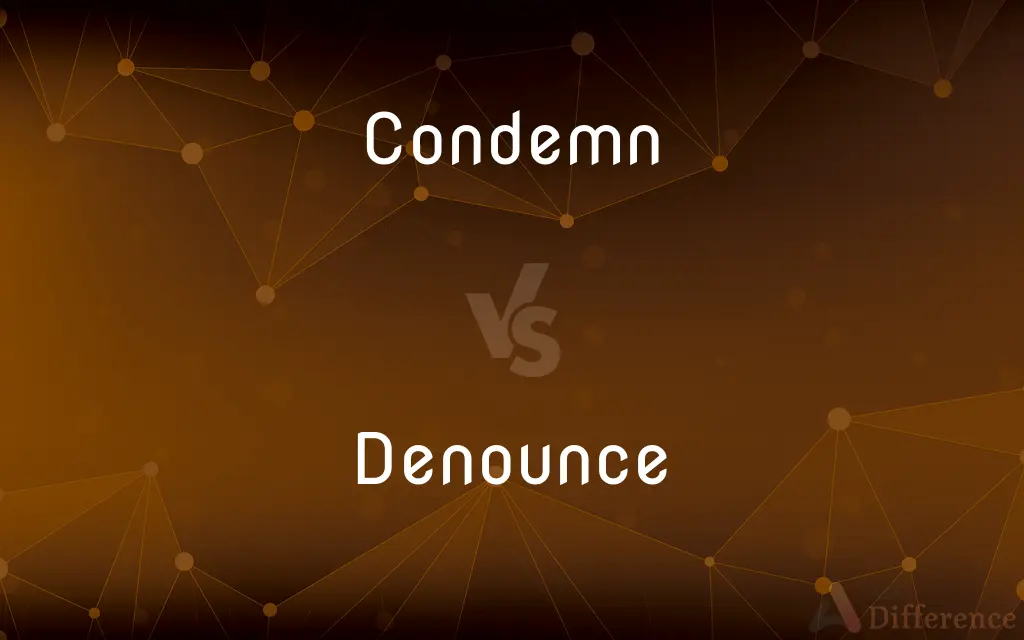Condemn vs. Denounce — What's the Difference?

Difference Between Condemn and Denounce
ADVERTISEMENT
Compare with Definitions
Condemn
Express complete disapproval of; censure
The plan was condemned by campaigners
Most leaders roundly condemned the attack
Denounce
To condemn openly as being wrong or reprehensible.
Condemn
Sentence (someone) to a particular punishment, especially death
The rebels had been condemned to death
Denounce
To inform against (someone); accuse publicly.
Condemn
To express strong disapproval of
Condemned the needless waste of food.
ADVERTISEMENT
Denounce
To give formal announcement of the ending of (a treaty).
Condemn
To pronounce judgment against; sentence
Condemned the felons to prison.
Denounce
To make known in a formal manner; to proclaim; to announce; to declare.
Condemn
To judge or declare to be unfit for use or consumption, usually by official order
Condemn an old building.
Denounce
(transitive) To criticize or speak out against (someone or something); to point out as deserving of reprehension, etc.; to openly accuse or condemn in a threatening manner; to invoke censure upon; to stigmatize; to blame.
To denounce someone as a swindler, or as a coward
Condemn
To force (someone) to experience, endure, or do something
"Those who cannot remember the past are condemned to repeat it" (George Santayana).
Denounce
(transitive) To make a formal or public accusation against; to inform against; to accuse.
To denounce a confederate in crime
To denounce someone to the authorities
Condemn
To lend credence to or provide evidence for an adverse judgment against
Were condemned by their actions.
Denounce
To proclaim in a threatening manner; to threaten by some outward sign or expression; make a menace of.
To denounce war; to denounce punishment
Condemn
(Law) To appropriate (property) for public use.
Denounce
(transitive) To announce the termination of; especially a treaty or armistice.
Condemn
(transitive) To strongly criticise or denounce; to excoriate the perpetrators of.
The president condemned the terrorists.
Denounce
To claim the right of working a mine that is abandoned or insufficiently worked.
Condemn
(transitive) To judicially pronounce (someone) guilty.
Denounce
To make known in a solemn or official manner; to declare; to proclaim (especially an evil).
Denouncing wrath to come.
I denounce unto you this day, that ye shall surely perish.
Condemn
(transitive) To judicially announce a verdict upon a finding of guilt; To sentence
The judge condemned him to death.
She was condemned to life in prison.
Denounce
To proclaim in a threatening manner; to threaten by some outward sign or expression.
His look denounced desperate.
Condemn
(transitive) To confer eternal divine punishment upon.
Denounce
To point out as deserving of reprehension or punishment, etc.; to accuse in a threatening manner; to invoke censure upon; to stigmatize.
Denounced for a heretic.
To denounce the immoralities of Julius Cæsar.
Condemn
(transitive) To adjudge (a building) as being unfit for habitation.
The house was condemned after it was badly damaged by fire.
Denounce
Speak out against;
He denounced the Nazis
Condemn
(transitive) To adjudge (building or construction work) as of unsatisfactory quality, requiring the work to be redone.
Denounce
To accuse or condemn or openly or formally or brand as disgraceful;
He denounced the government action
She was stigmatized by society because she had a child out of wedlock
Condemn
(transitive) To adjudge (food or drink) as being unfit for human consumption.
Denounce
Announce the termination of, as of treaties
Condemn
To declare something to be unfit for use, or further use.
Denounce
Give away information about somebody;
He told on his classmate who had cheated on the exam
Condemn
(transitive) To determine and declare (property) to be assigned to public use. See eminent domain.
Condemn
To declare (a vessel) to be forfeited to the government, to be a prize, or to be unfit for service.
Condemn
To pronounce to be wrong; to disapprove of; to censure.
Condemn the fault, and not the actor of it!Why, every fault's condemned ere it be done.
Wilt thou condemn him that is most just?
Condemn
To declare the guilt of; to make manifest the faults or unworthiness of; to convict of guilt.
The queen of the south shall rise up in the judgment with this generation, and shall condemn it.
Condemn
To pronounce a judicial sentence against; to sentence to punishment, suffering, or loss; to doom; - with to before the penalty.
Driven out from bliss, condemnedIn this abhorred deep to utter woe.
To each his sufferings; all are men,Condemned alike to groan.
And they shall condemn him to death.
The thief condemned, in law already dead.
No flocks that range the valley free,To slaughter I condemn.
Condemn
To amerce or fine; - with in before the penalty.
The king of Egypt . . . condemned the land in a hundred talents of silver.
Condemn
To adjudge or pronounce to be unfit for use or service; to adjudge or pronounce to be forfeited; as, the ship and her cargo were condemned.
Condemn
To doom to be taken for public use, under the right of eminent domain.
Condemn
Express strong disapproval of;
We condemn the racism in South Africa
These ideas were reprobated
Condemn
Declare or judge unfit;
The building was condemned by the inspector
Condemn
Compel or force into a particular state or activity;
His devotion to his sick wife condemned him to a lonely existence
Condemn
Demonstrate the guilt of (someone);
Her strange behavior condemned her
Condemn
Pronounce a sentence on (somebody) in a court of law;
He was condemned to ten years in prison
Share Your Discovery

Previous Comparison
Trust vs. Tryst
Next Comparison
Asking vs. Request













































